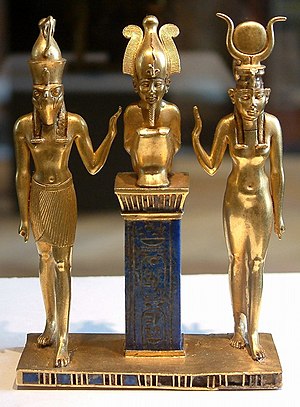Isis endured a difficult pregnancy with exceptionally long labor and gave birth to Horus alone in the swamps of the Delta. She hid herself and her son from Set and his demons in the thickets, only going out at night for food accompanied by a bodyguard of seven scorpions who were given her by the goddess Selket. Selket (and, in some versions of the story, Neith) watched over Horus while Isis went out. Isis, Selket, and Neith nurtured Horus and educated him in their exile until he was grown to manhood and was strong enough to challenge his uncle for his father’s kingdom.
The story of the battles between Horus and Set have many different versions but the best known is from a manuscript dating to the 20th Dynasty (1090-1077 BCE), The Contendings of Horus and Set which describes their contest as a legal trial in front of the Ennead, a tribunal of nine powerful gods. In this version of the story, Horus brings a complaint against Set – who is one of the nine – claiming he has unlawfully taken the throne from Osiris – who is also one of the nine judges. The tribunal is asked to decide between Horus and Set and most of the gods choose Horus but Ra, the supreme god, claims that Horus is too young and inexperienced and Set has the better claim to rule. Horus and Set must compete in a series of battles to prove which is best able to reign. In the course of these battles, Horus loses an eye and Set is castrated (or, at least, severely damaged) but Horus is victorious each time.
These contests go on for over 80 years and Ra continues to deny Horus his right to the throne. Meanwhile, the land is suffering under Set’s rule and Isis is desperate to do something to help her son and her people. She transforms herself into a beautiful young woman and sits down in front of Set’s palace where she begins to cry. When Set comes out and sees her, he asks the cause of her sorrow and she tells him how a wicked man, her husband’s own brother, has killed him and taken his land and, further, seeks the life of her only son and has banished her to the swamp lands and the thickets where only the scorpions are her companions.
Set is outraged by her story and declares that this man should be punished. He swears that he, himself, will go find this man and cast him from the lands and restore the woman and her child to their rightful place. Isis then throws off her disguise and reveals herself and the other gods in attendance. Set has condemned himself by his own decree and Ra agrees with the other gods that Horus should be king. Set is then banished to the desert lands beyond Egypt’s borders while Horus assumes the throne of his father with his mother and aunt Nephthys as consorts.
In another version of the story, the trial lasts for 80 years until the frustrated gods turn to the wise goddess Neith, mediator of disputes, who rules in favor of Horus. She suggests that Set be given reign of the desert regions while Horus rules the fertile Nile River Valley. As a consolation, she proposes, Set should also be given two foreign goddesses as consorts – the warrior-goddess Anat from Syria and Astarte, the Queen of Heaven, from Phoenicia. This version of the story explained how Set came to be associated with people of foreign lands as well as the desert regions.
